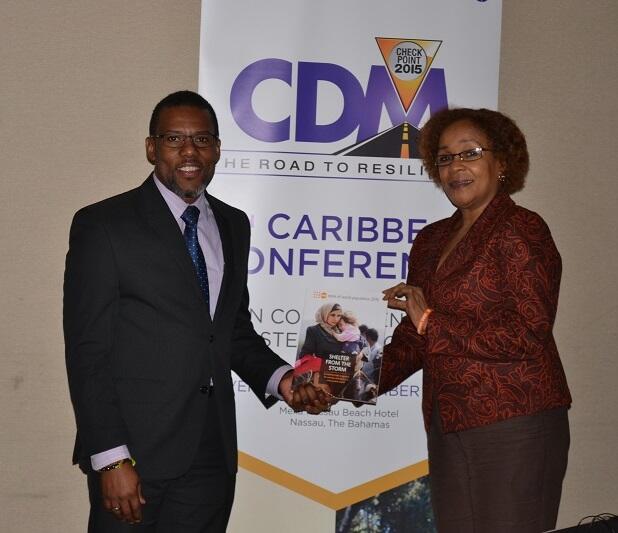Ronald Jackson, Exeuctive Director, CDEMA receives a copy of the report from Siti Oussein, Deputy Director, UNFPA Sub-Regional Office for the Caribbean during the regional launch, at the the Melia Hotel Resort, Nassau, The Bahamas.
The health needs of women and adolescents are too often neglected in humanitarian response to natural disasters and conflicts around the world, even though whether women and girls live or die in a crisis often depends on access to basic sexual and reproductive health services like midwives and HIV prevention, says a new report released today by UNFPA, the United Nations Population Fund.
The State of World Population 2015, "Shelter from the Storm", shows that of the 100 million people in need of humanitarian assistance around the world today, about 26 million are women and adolescent girls in their childbearing years.
Sexual and reproductive health services critical to the health and survival of women and adolescents are scarcest at the time they are needed most, The State of World Population says. Three fifths of maternal deaths today occur in countries that are considered fragile because of conflict or disaster. Pregnancy and childbirth kill 507 women every day in these settings.
"The health and rights of women and adolescents should not be treated like an afterthought in humanitarian response," says UNFPA Executive Director, Dr. Babatunde Osotimehin. "For the pregnant woman who is about to deliver, or the adolescent girl who survived sexual violence, life-saving services are as vital as water, food and shelter."
Without the usual protection of family and community, women and adolescents are more vulnerable to sexual violence, unwanted pregnancy and sexually transmitted infections, like HIV. Basic needs for safe childbirth, family planning and reproductive health care are rarely met when women and adolescents become untethered from the lifeline of health systems.
"Having the means to prevent a pregnancy and being safe from sexual violence-these are basic human rights," Dr. Osotimehin says. "Rights don't just go away, and women don't stop giving birth when a conflict breaks out or disaster strikes."
Because there are so many conflicts and disasters in the world today, UNFPA is delivering an increasing share of its services in crises, the report shows. UNFPA has responded to crises in 38 countries in 2015.
Protecting the health and rights of women and adolescents is not only critical to weathering the worsening storm of wars and natural disasters, but can also accelerate recovery from crises, the UNFPA report shows. A better, stronger and more resilient shelter is needed to help them weather the storms that endanger their health, rights and futures.
The current shelter, according to the UNFPA report, is unable to protect all those who need it.
In 2014, for example, the United Nations required a record $19.5 billion to respond to humanitarian situations around the world, but faced a record $7.5-billion shortfall, jeopardizing the health and lives of millions of people. UNFPA in 2015 received less than half the funding it required to meet the essential sexual and reproductive health needs of women and adolescents.
Because the demand for humanitarian assistance outpaces supply, a new approach is needed, with a new emphasis on prevention, preparedness and building resilience of nations, communities, institutions and individuals. A pathway to resilience is equitable, inclusive development that protects rights, including reproductive rights, the report concludes.
"The business-as-usual approach to humanitarian assistance will leave too many behind at a time when needs are so great," Dr. Osotimehin says. "We need to do a much better job of helping the most vulnerable, especially adolescent girls. But we must also do a much better job of investing in a more stable world, capable of withstanding the storms ahead."
The report was launched in the Caribbean today at the 9th Comprehensive Disaster Management Conference put on by the Caribbean Disaster Emergency Management Agency, CDEMA at the Melia Hotel Resort, Nassau, The Bahamas.


